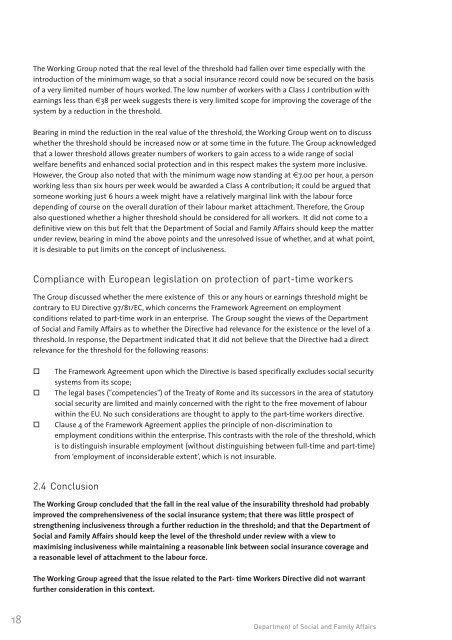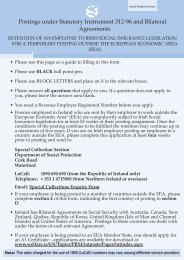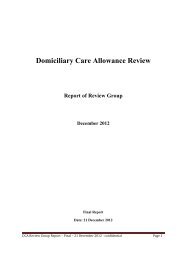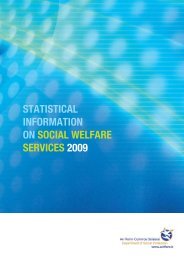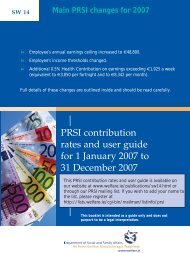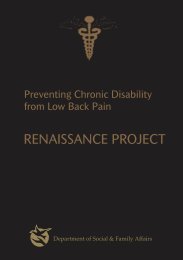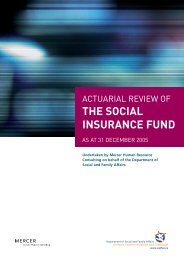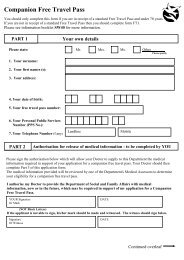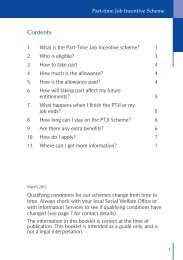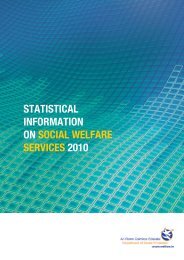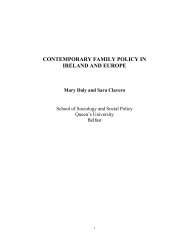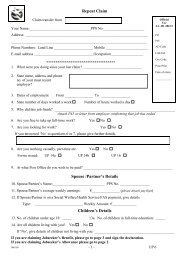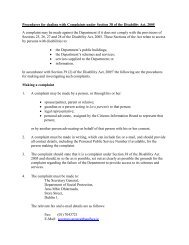Developing a Fully Inclusive Social Insurance Model - Welfare.ie
Developing a Fully Inclusive Social Insurance Model - Welfare.ie
Developing a Fully Inclusive Social Insurance Model - Welfare.ie
You also want an ePaper? Increase the reach of your titles
YUMPU automatically turns print PDFs into web optimized ePapers that Google loves.
The Working Group noted that the real level of the threshold had fallen over time especially with theintroduction of the minimum wage, so that a social insurance record could now be secured on the basisof a very limited number of hours worked. The low number of workers with a Class J contribution withearnings less than €38 per week suggests there is very limited scope for improving the coverage of thesystem by a reduction in the threshold.Bearing in mind the reduction in the real value of the threshold, the Working Group went on to discusswhether the threshold should be increased now or at some time in the future. The Group acknowledgedthat a lower threshold allows greater numbers of workers to gain access to a wide range of socialwelfare benefits and enhanced social protection and in this respect makes the system more inclusive.However, the Group also noted that with the minimum wage now standing at €7.00 per hour, a personworking less than six hours per week would be awarded a Class A contribution; it could be argued thatsomeone working just 6 hours a week might have a relatively marginal link with the labour forcedepending of course on the overall duration of their labour market attachment. Therefore, the Groupalso questioned whether a higher threshold should be considered for all workers. It did not come to adefinitive v<strong>ie</strong>w on this but felt that the Department of <strong>Social</strong> and Family Affairs should keep the matterunder rev<strong>ie</strong>w, bearing in mind the above points and the unresolved issue of whether, and at what point,it is desirable to put limits on the concept of inclusiveness.Compliance with European legislation on protection of part-time workersThe Group discussed whether the mere existence of this or any hours or earnings threshold might becontrary to EU Directive 97/81/EC, which concerns the Framework Agreement on employmentconditions related to part-time work in an enterprise. The Group sought the v<strong>ie</strong>ws of the Departmentof <strong>Social</strong> and Family Affairs as to whether the Directive had relevance for the existence or the level of athreshold. In response, the Department indicated that it did not bel<strong>ie</strong>ve that the Directive had a directrelevance for the threshold for the following reasons:" The Framework Agreement upon which the Directive is based specifically excludes social securitysystems from its scope;" The legal bases ("competenc<strong>ie</strong>s") of the Treaty of Rome and its successors in the area of statutorysocial security are limited and mainly concerned with the right to the free movement of labourwithin the EU. No such considerations are thought to apply to the part-time workers directive." Clause 4 of the Framework Agreement appl<strong>ie</strong>s the principle of non-discrimination toemployment conditions within the enterprise. This contrasts with the role of the threshold, whichis to distinguish insurable employment (without distinguishing between full-time and part-time)from ‘employment of inconsiderable extent’, which is not insurable.2.4 ConclusionThe Working Group concluded that the fall in the real value of the insurability threshold had probablyimproved the comprehensiveness of the social insurance system; that there was little prospect ofstrengthening inclusiveness through a further reduction in the threshold; and that the Department of<strong>Social</strong> and Family Affairs should keep the level of the threshold under rev<strong>ie</strong>w with a v<strong>ie</strong>w tomaximising inclusiveness while maintaining a reasonable link between social insurance coverage anda reasonable level of attachment to the labour force.The Working Group agreed that the issue related to the Part- time Workers Directive did not warrantfurther consideration in this context.18Department of <strong>Social</strong> and Family Affairs


